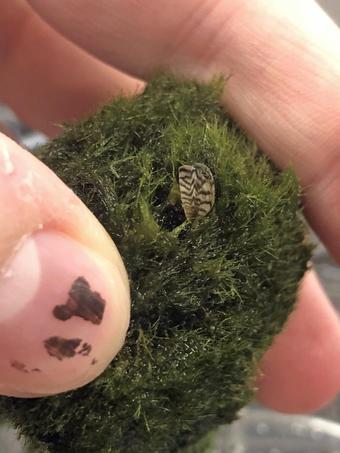Invasive zebra mussels have been found in "moss balls,” an aquarium plant product sold at aquarium and pet supply stores. Moss balls are a commonly used decorative algae in aquariums and water gardens.
See also: Pathways for other means and routes invasive species are introduced into new environments.
What is the Situation?
U.S. Geological Survey (USGS) scientists were notified on February 25, 2021 that zebra mussels were found attached and inside moss balls sold as aquarium plants. The report came from a Seattle PetCo employee who found zebra mussels attached and inside “Betta Buddy Marimo Ball” moss plants.
Zebra mussels are regarded as one of the most destructive invasive species in North America. Zebra mussels can quickly take over once they get established in a waterbody and cause significant damage including disrupting the food chain, changing the chemistry of the water (which can cause more blue green algae outbreaks or offensive taste), and clogging water intake and delivery systems. The concern is that live mussels released into a storm drain or flushed could be introduced into a waterway.
2024:
- See related resource: Invasive Zebra Mussels Detected on Aquarium Marimo Moss Balls (Washington Department of Fish and Wildlife Press Release, Aug 8, 2024)
2021:
- Invasive Zebra Mussels Found in Pet Stores in 21 States (USGS Press Release, Mar 8, 2021)
- Invasive Species Alert! Zebra Mussels Found Hitchhiking in Aquatic Moss Balls (National Park Service, Great Lakes Research and Education Center (Mar 20, 2021)
How Many States have Detected Zebra Mussels in Moss ball products?
As of April 27, 2021, zebra mussel contaminated moss balls have been discovered in 46 states. The only states yet to report contaminated moss balls are West Virginia, Delaware, Rhode Island, and Hawaii.
What are Moss Balls?
A moss ball is a species of green algae that is formed into a ball and is 2 to 5 inches in diameter. Moss balls are purchased for home aquariums are found in pet stores nationwide. Zebra mussel larvae are so small that people cannot see them. If released, these larvae can cause great harm to water bodies. Consumers are advised to remove and properly dispose of any moss balls purchased within the last year.
What Action is Being Taken?
The U.S. Fish and Wildlife Service (USFWS) is coordinating the response along with the USGS. The U.S. Department of Agriculture, several state wildlife agencies and an industry group, the Pet Industry Joint Advisory Council, are also taking steps to mitigate the problem. National alerts have gone out from the USFWS, the federal Aquatic Nuisance Task and regional aquatic invasive species management groups.
The USFWS is providing information detailed information on Invasive Zebra Mussels Found in Moss Balls.
What You Can DO?
If you recently purchased moss balls for your aquarium, they must be properly destroyed - don't dump them! Refer to Zebra Mussel Disposal Instructions.
Consumers should be advised that moss ball products purchased from PetSmart Petco may be subject to a voluntary product recall.
Please add reports of zebra mussels attached to moss balls to the USGS NAS Database - Sighting Report Form.

